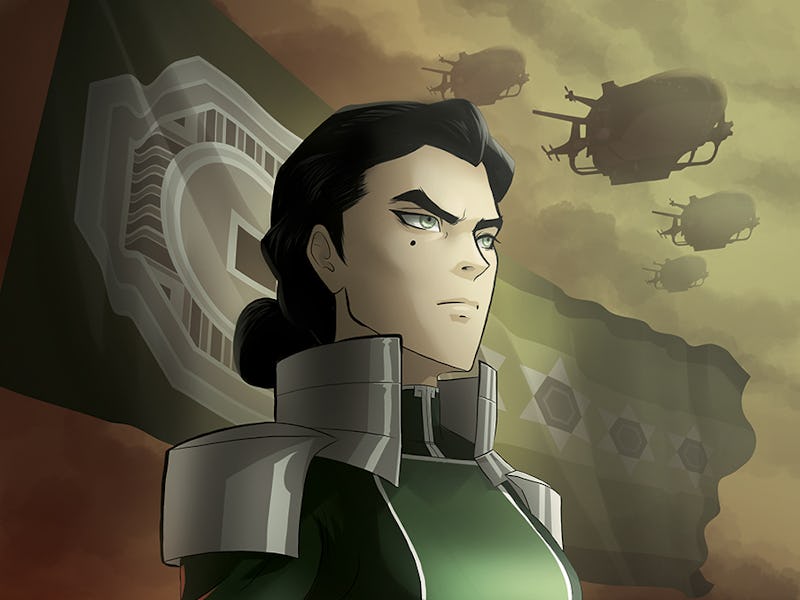Avatar the Last Airbender theory explains a shocking Earth Kingdom mystery
Kuvira's rise to power in 'The Legend of Korra' makes a lot more sense when you remember this 'Avatar: The Last Airbender' story.

There are some moments from Avatar: The Last Airbender that I'll never forget. The final showdown between Aang and the Fire Lord. The first time meeting Toph. But there are other, equally powerful plotlines that I had no memory of until reaching them in my recent Avatar: The Last Airbender rewatch on Netflix.
The horrors of Ba Sing Se (a glorious, walled city with a terrible secret) was one of those plotlines, and after rewatching that Season 2 arc, I think I understand one of the best villains in Avatar's sequel series a little better. Here's how The Last Airbender's Ba Sing Se story explains one of the biggest mysteries of The Legend of Korra: Kuvira.
If you've never watched The Legend of Korra (or you hit a wall in its admittedly uninspired Season 2) you need to stop reading this now and binge the entire thing. Trust me, it's worth it, and this article will be waiting for you when you're done.
For anyone who hasn't watched Korra since its season finale in 2014, here's a quick refresh. The series takes place a generation after The Last Airbender in a united world left behind by Avatar Aang. But this world is far from perfect, and each season features a different villain with a vision for how to fix the world and a violent plan to accomplish it.
Kuvira in 'The Legend of Korra.'
Of Korra's rogue's gallery, no one is more terrifying that General Kuvira, a powerful metalbender who takes advantage of the Avatar's absence after Season 3 and a lack of political leadership to install herself as ruler of a new Earth Empire. The Great Uniter, as she calls herself, demands that the United Republic of Nations return the land taken from the Earth Kingdom before setting out to conquer the world and restore the Earth Kingdom to its former power. She cajoles smaller Earth Kingdom towns into accepting her protection and then forces their inhabitants into slave labor and reeducation camps.
Kuvira used military force to bully the rest of the world into submitting to her will, and fans of the show quickly compared her to Hitler and other fascist leaders, even while agreeing that her motivations were understandable. The once-great Earth Kingdom wasn't getting a fair shake in what was supposed to be a utopian civilization, but Kuvira's violence still feels like a disproportionate response.
Until you remember the story of Ba Sing Se...
Ba Sing Se is a massive walled city in 'Avatar: The Last Airbender.'
In the original Avatar series, Ba Sing Se is referred to often before we ever see it. It's a mythical walled city so well-fortified that the evil Fire Nation's most powerful forces couldn't conquer it after a siege that lasted for 600 days. It's a big deal when Aang and his friends reach the city, which by that point is the last remaining holdout of Fire Nation rule, but we quickly learn that things are even worse inside the city's walls than they are outside.
The city state is presumably ruled by the Earth King, but it turns out he's little more than a figurehead. Ba Sing Se is actually controlled by Grand Secretariat Long Feng and his army of secret police called the Dai Li. Feng keeps the war with the Fire Nation a secret from the king while the Dai Li patrol the city, arresting and brainwashing anyone who talks about war or disrupts the peace in any way.
Lei Feng uses hypnosis to control the masses in Ba Sing Se.
How does this all connect? It's tough to say, and I hesitate to speculate that the Earth Kingdom has fascist tendencies. After all, history has shown that any nation can be vulnerable to fascism given the wrong leader at the wrong time.
That said, Ba Sing Se's shameful secret past helps explain the hollowness of Kuvira's campaign to unite the Earth Kingdom. In The Legend of Korra, Kuvira rises to power by stabilizing Ba Sing Se after the Earth Queen is assassinated and anarchy breaks out. But as soon as Kuvira is installed as a "provisional leader" she dissolves the Kingdom and replaces it with an evil empire.
If Ba Sing Se had a strong history of democratic rule (or even a good track record with its monarchs), then Kuvira's rise to power might never have happened. But in the historical absence of actual good leadership, the Great Uniter's fascist power grab makes a lot more sense.
This article was originally published on